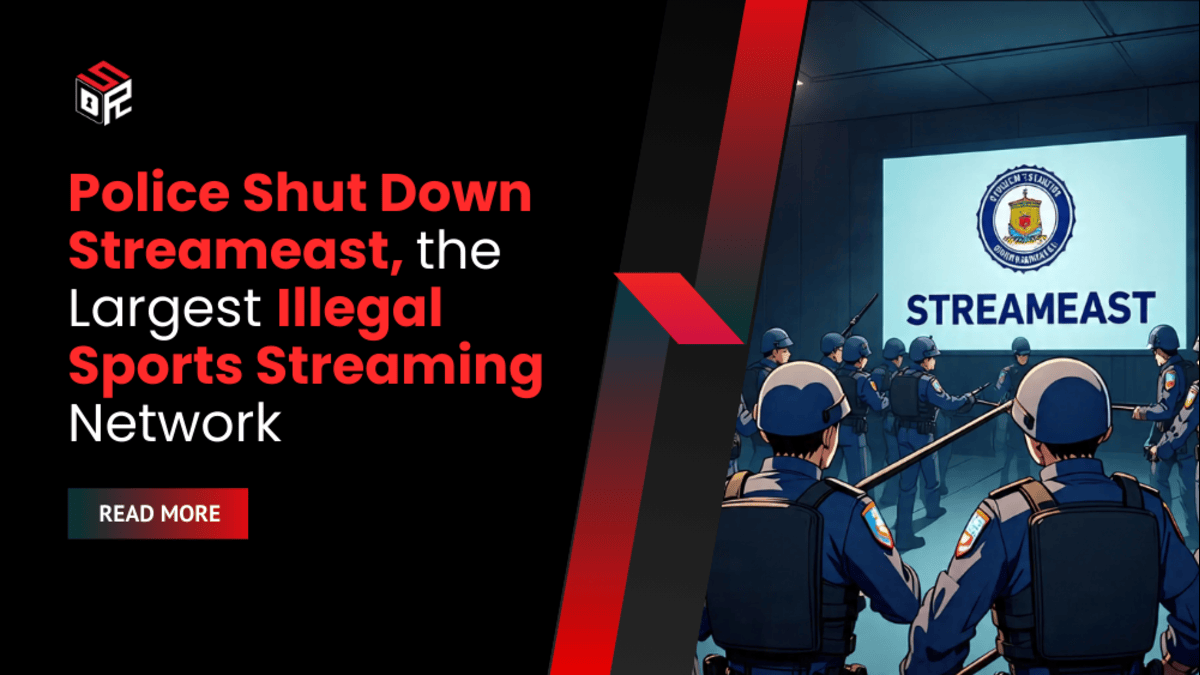Authorities have dismantled Streameast, the world’s largest pirated sports streaming service, following a joint operation between the Alliance for Creativity and Entertainment (ACE) and Egyptian law enforcement. The crackdown led to the arrest of two individuals allegedly tied to the network, which had become a central hub for free, illegal access to major sporting events across the globe.
How Streameast Built Its Global Audience
Launched in 2018, Streameast operated as a free streaming platform supported by advertising revenue. Over time, it grew into a massive operation, hosting more than 80 domains that collectively generated 136 million visits each month. In the last year alone, the service logged 1.6 billion site visits, with the largest traffic coming from the United States, Canada, the United Kingdom, the Philippines, and Germany.
The appeal was clear: viewers could access unauthorized HD streams of matches from leading soccer leagues such as the Premier League, La Liga, Serie A, Bundesliga, Ligue 1, Primeira Liga, and Major League Soccer. Beyond league coverage, Streameast also broadcast high-profile tournaments, including the FIFA World Cup, UEFA Euro, Copa América, and UEFA Nations League, as well as the Champions League and Europa League.
Coverage Extended Beyond Soccer to Major U.S. Sports
While soccer formed the backbone of Streameast’s offering, the network’s reach extended well beyond football fans. It provided access to broadcasts of the NFL, NBA, NHL, and MLB, attracting large U.S. audiences. Fans could also watch combat sports such as pay-per-view boxing and MMA, along with motorsports events including Formula One and MotoGP.
This breadth of content made Streameast one of the most visited illegal streaming services in the world and a major threat to both rights holders and the broader sports industry.
Early Signs of Disruption Reported by Users
The first indications that Streameast was under pressure appeared nearly a week before the official announcement. Users on Reddit began reporting difficulties accessing the site, citing failures in streaming services and chat functions.
Today, ACE confirmed that the disruptions were the result of an enforcement operation carried out in partnership with Egyptian authorities.
Industry Leaders Call It a Major Victory
For sports rights holders and streaming companies, the takedown of Streameast represents a significant win.
“Dismantling Streameast is a major victory for everyone who invests in and relies on the live sports ecosystem,” said Ed McCarthy, Chief Operating Officer of DAZN Group. “This criminal operation was siphoning value from sports at every level and putting fans across the world at risk.”
Arrests and Financial Trail Uncovered
According to the New York Times, Egyptian police arrested two people in El-Sheikh Zaid, located in the Giza Governorate. The arrests were accompanied by the seizure of laptops, smartphones, cash, and multiple credit cards.
Investigators also traced Streameast’s financial operations to a shell company in the United Arab Emirates, which allegedly laundered advertising revenue totaling $6.2 million since 2010. Authorities further uncovered approximately $200,000 in cryptocurrency linked to the illicit streaming business.
Domains Redirected to Legal Content Providers
As part of the disruption, 80 Streameast domains were seized and now redirect visitors to ACE’s “Watch Legally” website, which promotes licensed platforms for consuming live sports.
However, researchers noted that some Streameast-related domains remain online and do not redirect to ACE’s portal, suggesting either not all domains were captured or new ones have since been registered.
Streameast is the latest in a long line of platforms targeted by ACE and international authorities as part of a global crackdown on piracy. Sports streaming piracy remains one of the most challenging enforcement areas, with platforms quickly resurfacing even after takedowns. The case underscores both the scale of demand for illegal sports content and the need for sustained cooperation between rights holders, law enforcement, and technology providers.









